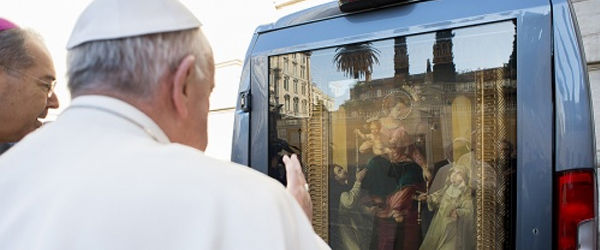While a new study of evangelical college students finds that up to half of them can drift from their faith while attending school, Catholics in campus ministry say that the findings are applicable to Catholic college students as well.The study, "Sticky Faith," found that the drift applied whether a student was living on campus or commuting from home, and that students were just as susceptible even if they were enrolled at a religiously affiliated school.Kara Powell, one of the study's authors who teaches at Fuller Theological Seminary in Pasadena, said that the first two weeks of school frequently determine whether a Christian student's faith will be sustained during their undergraduate years."They're in a world where there's nobody they know," Powell said. College is a lot like a second junior high — experimenting with their identities. They'll be one way one day and another way with a different group of people. There's no coherence between their current peer group and their former peer group.""Sticky Faith" examined the transition made by students who were members of their local congregation's youth ministry. Powell said teens not involved in a church youth ministry were not examined.For students who drift away from practicing their faith, it's not until one to six years after graduation from college, when marriage and children enter the picture, that they re-establish connections with their faith."Those surveys are probably somewhat true. I have no reason to think otherwise," said Nick Cardilino, associate director of campus ministry at the Marianist-run University of Dayton, with 20 years in campus ministry at the Ohio Catholic college.Matt Robaszkiewicz, of the National Federation for Catholic Youth Ministry, agreed. "It's endemic with the age group across all faith denominations," he said. "I think it's just the thing of being a collegiate and a young adult in these times, when people are much more transient."Resident students will have more of a connection with a campus youth organization. Commuters, typically they're there for class and are working off-campus, and don't come back for campus extracurricular activities. That makes it difficult. Parishes don't tend to have a strong outreach.""Sticky Faith" said students commonly wear their faith as a "Jesus jacket" that can be worn or doffed as situations warrant."They barely keep it on during high school. When they get to college there's a big party the first night and they don't know anybody (there)," Powell said. "What's sad is that they don't realize faith is much more than a jacket."The first two weeks (of college) set the trajectory for the next four years, he continued. “Students frequently define themselves, 'I'm not a Christian, I'm someone who parties,’” Powell said. “It becomes a self-fulfilling perpetuation of who they will be."Dayton's Cardilino said he doesn't buy completely into that analysis. "It's a yes-and-yes, not an either-or" response, he told CNS. "Are first-year students always ready to jump on the campus ministry train? In reality, of course no. But some of them in their sophomore year, junior or senior year, do. They start exploring what their faith means in a deeper way."On the other hand, Cardilino noted, "I'm kind of exhausted" from the start of school in September, where all sorts of activities and initiatives are offered to students, most of whom live on campus, at the 7,000-student University of Dayton.Reaching out is key, he said. "That's why we have a campus ministry team of 30. Even though we're a midsize university, students are actually quite well aware of not only the presence of campus ministry on our campus — but we're pretty amazingly clear about our Catholic identity," Cardilino added.For those students who have drifted away from the practice of their faith, it's not until one to six years after graduation from college, when marriage and children enter the picture, that they re-establish connections with their faith, according to Powell.She said the focus needs to be on congregations' youth ministries to better prepare the teenagers in their midst for the transition to college life.One strong factor in teens retaining their faith while at college, "Sticky Faith" found, was the existence of an intergenerational component at their home church's youth ministry."We spend so much energy on youth ministry and resources, etc., that it separates 16-year-olds from the rest of the church. It segregates youths from the rest of the church — and that's not a verb I use lightly," Powell said. "There's 16-year-olds who need to rub shoulders with 46-year-olds and 86-year-olds."Robaszkiewicz said the issues tackled by "Sticky Faith" have already been intuited by national Catholic youth ministry leaders."We were realizing there wasn't much for college-age young people on a national level," he said, "so in conjunction with the National Catholic Youth Conference (Nov. 17-19 in Indianapolis), a good number of the workshops are targeted to that age group. How do you make that transition, how to take the experience and bump it up a notch or two — what does it mean for me know as a collegiate young adult?"—CNS

